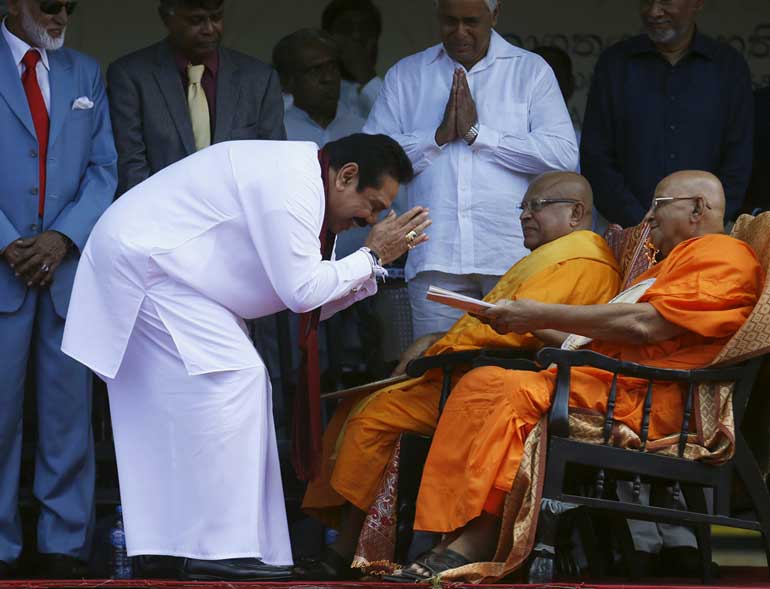Wednesday Feb 25, 2026
Wednesday Feb 25, 2026
Saturday, 15 August 2015 00:00 - - {{hitsCtrl.values.hits}}
 Sri Lanka’s former president Mahinda Rajapaksa, who is contesting in the upcoming general election, hands over the first copy of his manifesto to a Buddhist monk, during the manifesto’s launch ceremony, in Colombo July 28, 2015. REUTERS/Dinuka Liyanawatte
Sri Lanka’s former president Mahinda Rajapaksa, who is contesting in the upcoming general election, hands over the first copy of his manifesto to a Buddhist monk, during the manifesto’s launch ceremony, in Colombo July 28, 2015. REUTERS/Dinuka Liyanawatte
Kurunegala, Sri Lanka (Reuters): Former President Mahinda Rajapaksa has ventured out of his southern power base and into Sri Lanka’s Buddhist heartland in his bid to regain power in Monday’s parliamentary election, eight months after crashing to defeat in a presidential vote.
A 27-meter statue of Buddha gazes from atop Elephant Rock over the provincial city of Kurunegala where the 69-year-old strongman is running, a reminder of his appeal to Sinhala-speaking Buddhists who make up more than seven in 10 voters nationwide.
The capital of Sri Lanka’s Northwestern Province also has a concentration of army personnel, veterans and widows of the 26-year civil war. They are natural supporters of Rajapaksa, who crushed ethnic minority Tamil rebels in 2009 and styles himself as a national saviour.
Yet the predominant colours in the area are not the blue of his Sri Lanka Freedom Party (SLFP), but the green of Premier Ranil Wickremesinghe’s United National Party (UNP) that formed a minority government after Rajapaksa was ousted in January.
“His time is over,” Wickremesinghe, a three-time premier, told about 5,000 supporters at a campaign rally here, urging voters to send Rajapaksa into retirement.
Deprived of his customary control over the state media and security apparatus, Rajapaksa has struggled to build a groundswell of support to back a bid to lead the next Government.
“The UNP and their coalition have momentum,” said Alan Keenan, a Sri Lanka analyst at the International Crisis Group.
Sri Lanka’s 15 million voters go to the polls on Monday to elect the 225-strong parliament. Most seats will be decided in multi-member districts where voters can pick three names from a party list. Results are due on Tuesday.
Head-to-head
Pundits say Wickremesinghe would have the edge in a head-to-head contest for the premiership that Rajapaksa covets to relaunch his career and, opponents say, stay out of legal trouble.
Minority Tamils and Muslims are broadly sympathetic to the ruling coalition, while Rajapaksa only enjoys a slight lead among Sinhala voters, according to one survey.
In Kurunegala, where mosques and Muslim businesses were attacked by stone-throwing Buddhist militants last year, fear of Rajapaksa lingers on.
“We are afraid that the persecution of minorities could happen again if Rajapaksa returns,” said Mohammad Sifnas, who runs a grocery stall in the central market.
His neighbor, K.G. Manjula Wijesinghe, a Buddhist, says: “Rajapaksa did not give any benefits to the public when he was in power. It’s a family of bandits.”
The last 10 days of campaigning has been overshadowed by a murder investigation into the death in 2012 of national rugby player Wasim Thajudeen, whose remains were exhumed on Monday.
A government spokesman has alleged that three members of Rajapaksa’s security detail tortured Thajudeen to death. Rajapaksa, whose second son, Yoshitha, was captain of the national side at the time, denies that.
Rajapaksa and two brothers who both held high government office are also battling corruption allegations linked to lucrative Chinese investments.
Back in Kurunegala, Northwestern Province Chief Minister Dayasiri Jayasekara, who is running on the SLFP slate, called Rajapaksa a “war hero.”
But he also urged Rajapaksa to mend fences with Sirisena, who has ruled out appointing his predecessor as Prime Minister.
“We are the people to patch up these two rivals,” he told Reuters.